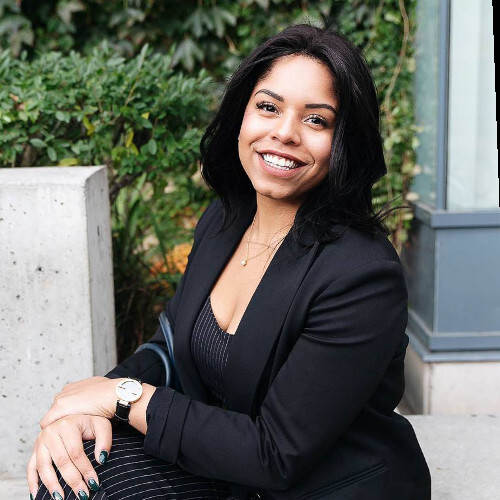Antuanette Gomez and her partner were going through one of those spells that folks in long-term relationships will all recognize. “We were on and off, always having arguments,” she says. “I wanted to try something different, not necessarily couples’ therapy.” Gomez, who was working as a professional holistic nutritionist and yoga instructor in Toronto, found a tantric retreat nearby.
Tantra had a big appeal to her. “It’s a sacred philosophy about finding love and enlightenment in every moment,” she explains. “Being able to feel love and sex and pleasure while making your coffee in the morning, while going for a simple walk with your partner. Being able to look at your partner and your life in a more intimately charged way, which can be really healing.”
But there was a catch. “On the first day they told us it was a sober retreat: no alcohol, no drugs, there’s nothing. My partner, who is a big lover of craft beer, was super upset at the beginning. But we found some really profound things,” she says.
Within the ancient Tantric teachings, she discovered practices like sexually charged breathing and erotic yoga. “I was also learning they used cannabis in these ancient practices: as an aphrodisiac, to connect more deeply and have more heightened experiences, sexually,” she says.
In 2015 she launched Pleasure Peaks, creating CBD pleasure products that would not only benefit people dealing with inflammation and chronic ailments.
Meanwhile, in her role as a nutritionist, she worked with patients suffering from chronic pain issues like Multiple Sclerosis, Crohn’s disease, cancer, and endometriosis. “So many of our patients were self-prescribing cannabis,” she says. These folks were often using smoke-able versions — under Canada’s medical marijuana policy — but Gomez figured that edible oils, topicals, lubricants and suppositories would be more efficient and safe for their bodies, especially vaginas and anuses.
So, in 2015 she launched Pleasure Peaks, creating CBD pleasure products that would not only benefit people dealing with inflammation and chronic ailments, but also those who might enjoy a little enhanced sensuality. She says she quickly garnered a big following among the LGBTQ community, especially among gay men who found the lubes beneficial for anal sex.
Apparently, they’re not the only ones. Since its founding her company has expanded to include hedonistic pleasure retreats in Hawaii and Jamaica, a podcast where regular people can share their stories, and a professional partnership with pharmaceutical experts to further research cannabis and sexual medicine.
This entrepreneurship has garnered Gomez accolades — including a mention on the Forbes 30 Under 30 list — but she’s keenly aware that her success as a young queer woman of color in this industry is a rarity. This is why she created an entire pipeline to get people start their own legal cannabis business.
“There’s a huge ‘grass ceiling’ here in Canada,” she says, citing a University of Toronto study that found 84% of cannabis industry leaders are white and 86% are male. Recreational cannabis has been legally regulated for almost three years, resulting in a surge of income for those able to bring the product to market, but Gomez says there are huge barriers to do so, “specifically because of me being a woman of color, not having generations of wealth.”
The people who monopolize cannabis in Canada today, she says, are often ex-police, political insiders, and those from the pharmaceutical industry. “It’s not their fault, it’s just there are systems in place to ensure they have the first access to those markets and the thing is: there are no people of color there.”
This entrepreneurship has garnered Gomez accolades — including a mention on the Forbes 30 Under 30 list — but she’s keenly aware that her success as a young queer woman of color in this industry is a rarity.”
“Cannabis has disproportionately impacted people of color in such terrible ways,” she says, noting that many Black, Latino and indigenous people have been put behind bars for the non-violent offense of marijuana possession — something that is legal today — leaving their lives totally derailed with no pathway to expungement. These experiences also add an additional obstacle to getting people of color into positions to profit from legalization.
Her own grandfather was deported from Canada for possession of less than an ounce of weed when she was around 8 years old. She continues to keep in touch with him through FaceTime, but her family is irrevocably changed. “My family was very scared about me getting into the cannabis industry after seeing what was done to my grandfather,” she says, “but now that they’ve seen my company thrive, they’re really happy and supportive. Of course, for a lot of others, it’s not the same.”
There’s the additional challenge of stigma, as both cannabis and sexuality face significant financial discrimination. Folks in stripping and pornography may be denied bank accounts or loans, have their online stores flagged, or find that other companies may not want to collaborate. The same goes for cannabis, despite it being comparably legal. “It’s really unfortunate, but at the same time, but what I’ve seen is that people will slowly adopt,” Gomez says, “Nobody wants to help us but it’s something only time can change.”
“It’s not going anywhere, this product,” she says, laughing, “and there are still people fighting for the future and that’s what I’m really excited to witness.”
Have a question for Dr. Timaree? Send an email to asktimaree@philadelphiaweekly.com.





